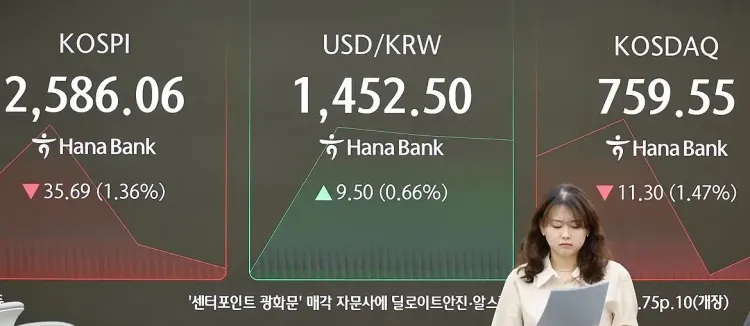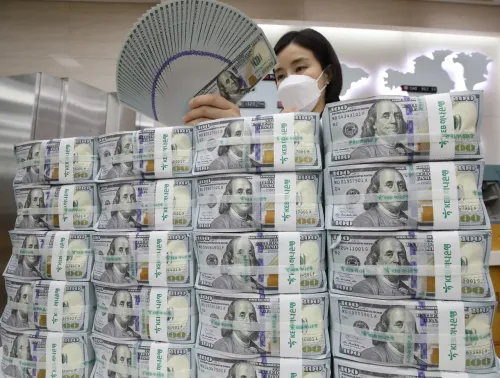Seoul Stocks Plummet Over 5.5% Amid Trump Tariff Panic

Synopsis
Key Takeaways
- Seoul stocks dropped more than 5.5%.
- KOSPI index fell to 2,328.20.
- Panic selling due to U.S. tariffs.
- Korean won hit a major low against USD.
- Heavy trading volume with losers dominating.
Seoul, April 7 (NationPress) South Korean equities plummeted by more than 5.5 percent on Monday, marking a fourth straight day of losses as investors reacted with panic to the intensifying global trade conflict ignited by reciprocal tariffs from the U.S. The Korean won experienced its most significant drop against the U.S. dollar since the COVID-19 pandemic.
The benchmark Korea Composite Stock Price Index (KOSPI) declined by 137.22 points, or 5.57 percent, closing at 2,328.20. The tech-heavy KOSDAQ also fell 5.8 percent, according to the Yonhap news agency.
Shortly after trading commenced, the stock exchange operator issued its first sidecar order since August 2024, pausing program buying for five minutes after the KOSPI 200 index dropped over 5 percent for more than one minute.
Trading volume was relatively high at 615.2 million shares, valued at 10.5 trillion won (approximately $7.16 billion), with the number of losers significantly outpacing winners at 862 to 68.
Foreign investors sold off 2.09 trillion won worth of domestic shares, while retail and institutional investors bought 1.67 trillion won and 253.2 billion won, respectively.
The KOSPI's sharp decline came as fears of a recession grew following the announcement of reciprocal tariffs by the Trump administration last week, which prompted China to retaliate with 34 percent tariffs on U.S. products and export restrictions on rare earths, hinting at further measures in the near future.
"Market volatility increased due to the Trump administration's unexpectedly strong tariff policies," noted Park Seok-joong, an analyst at Shinhan Securities.
"No Korean export sector can escape the impact of the U.S. tariff strategy."
Wall Street experienced its most challenging week since the COVID-19 pandemic last week, with the S&P 500 dropping 6 percent on Friday (U.S. time), while the Dow Jones Industrial Average fell 5.5 percent and the Nasdaq composite declined by 5.8 percent.
In Seoul, numerous large-cap stocks reached their lowest levels in a year.
Market leader Samsung Electronics fell 5.17 percent to 53,200 won, and its competitor in chip manufacturing, SK hynix, plummeted 9.55 percent to 164,800 won.
Leading automaker Hyundai Motor saw a decrease of 6.62 percent to 179,100 won, while major defense contractor Hanwha Aerospace plunged 8.55 percent to 642,000 won.
Notable shipbuilders Hanwha Ocean and HD Hyundai Heavy fell 9.81 percent and 8.17 percent to 62,500 won and 275,500 won, respectively.
Leading biopharmaceutical company Samsung Biologics dropped 5.71 percent to 1.01 million won, and steel giant POSCO Holdings tumbled 6.59 percent to 255,000 won.
Financial stocks also faced significant declines, with KB Financial dropping 6.95 percent to 72,300 won, while Meritz Financial lost 5.66 percent to 111,700 won.
By 3:30 p.m., the local currency was valued at 1,467.8 won per dollar, down 33.7 won from the previous session, marking the steepest single-day drop since March 19, 2020, when the currency fell by 40 won during the COVID-19 pandemic.










